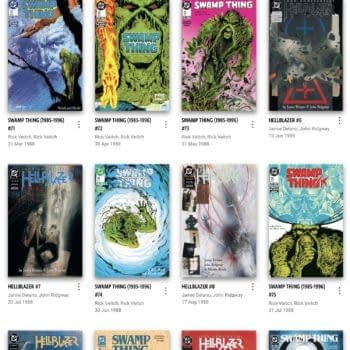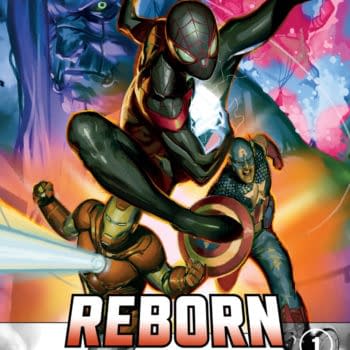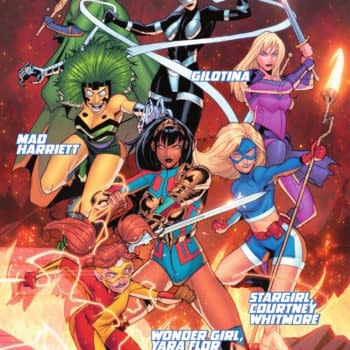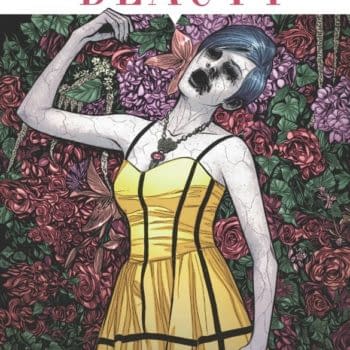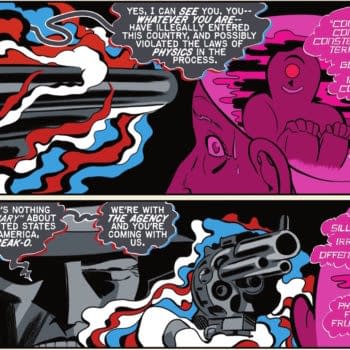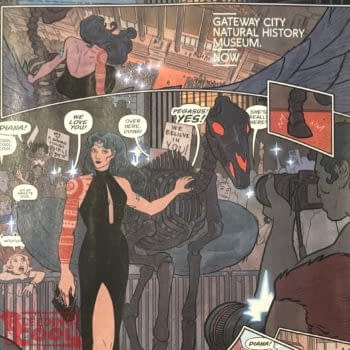Posted in: Comics, Current News | Tagged: diamond, Robert Gorin
Robert Gorin, Chief Restructuring Officer Of Diamond Comics, And Geek
Robert Gorin, Chief Restructuring Officer of Diamond's Bankruptcy, explains what Wicked's Elphaba teaches about transparency in times of crisis, and other musings.
Robert Gorin is the Diamond Chief Restructuring Officer, in charge of the Chapter 11 bankruptcy process. This comes as part of his role as Managing Director of Getzler Henrich, the middle market corporate turnaround and restructuring consultants hired by Diamond and the bankruptcy courts. Their biography says they are "a highly accomplished leader with an outstanding record of innovative growth strategies to achieve accelerated sales and profit" and who"brings more than 30 years of client-centric focus to business strategy and operations through his work in corporate turnarounds, process design and improvement, corporate mergers and acquisitions, and management consulting."
That includes being COO for a "$220 million consumer products company, "CRO of an international furniture manufacturer, and Interim COO of a $100mm, globally recognized, family-owned apparel and fashion company." Before Getzler Henrich, he was "President and General Manager of Camlog Biotechnologies, president and chief operating officer of EGC, Inc.," and had "multiple leadership roles with Chase Manhattan Bank."
But it seems he might also be a bit of a geek. Writing about what he calls "zombie companies" for Women's Wear Daily last October, he concluded
"As the characters in "The Walking Dead" learned, survival isn't just about making it through today — it's about building a sustainable future. By starting "tomorrow right now" — by recognizing problems early, taking decisive action and committing to the long haul — companies can rewrite their own stories and contribute to a healthier, more efficient economy.
On LinkedIn, he gives plenty of business advice, including the recent observation that "Comic book companies don't sell ink on paper—they sell stories, escapism, and inspiration." Well, if given the chance, they do. He also quotes Mr Spock from Star Trek when firing people, and how the needs of the many outweigh the needs of the few, before adding "leadership means carrying both". No, me neither. He talks about the lessons he learned from the film Wicked, saying
"Once again, Wicked proves itself an excellent business teacher. Just as Elphaba must learn to be proactive in telling her story, business executives must learn to lead with transparency—especially in times of crisis"
She is still the bad guy though, right? And then there was Avengers Endgame;
"One of my most treasured possessions is an Avengers movie poster that hangs above my desk. My wife must have bribed our local theater to get it, then had it framed for me. There's this one scene in End Game where one character—who can see all possibilities—says "I need a little time." You see his body vibrating as he looks into the future, searching through an infinite number of outcomes. When asked how many times they win against their seemingly unstoppable villain, he gives his answer: Once. Later, when they're fighting the villain, all seems lost. But that character who saw all possibilities looks up and gives this look—and in that moment, that single path to victory emerges. Sure, the good guys win because it's a fairy tale. But it's also a valuable reminder that nothing is ever 100%. No matter what, you have to play the game."
Or snap your fingers. Depends on what side you are on. And maybe he might see another future for comic book stores, promoting "phygital" retail, which is a made-up word. But then aren't they all?
"To phygitally shop means to merge digital experiences with physical channels — or ones that emulate physical channels (either through augmented reality or simulations). Imagine browsing a product online. You customize it, making it uniquely yours. Then, you travel to the physical store a few days later, where that personalized product is waiting for you. (Even easier? You have it shipped right to your home!)"
But a few days ago, he posted the following on LinkedIn, which has drawn some interest amongst those dealing with Diamond right now.
"Some people misinterpret my approach to leadership. They think caring about people makes me soft or someone they can take advantage of. I welcome that misunderstanding; they're in for a surprise. Understanding the human impact of business decisions isn't weakness—it's strength. When you meet people where they are emotionally, you're better positioned to lead the entire organization through change" accompanied by this Fred Rogers quote. "We live in a world in which we need to share responsibility. It's easy to say "It's not my child, not my community, not my world, not my problem." Then there are those who see the need and respond. I consider those people my heroes."
It's an attitude that some publishers wish was more observed in the field than in inspirational LinkedIn posts…
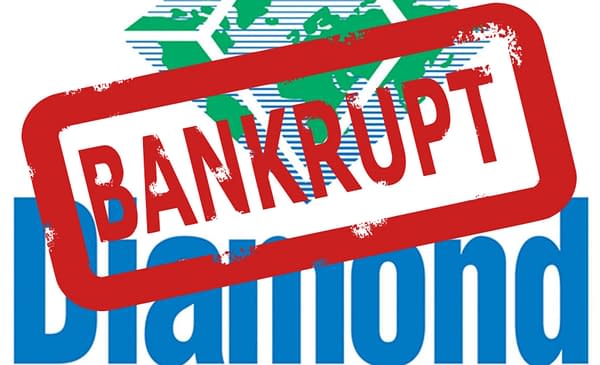
But you can use these Diamond tabs to keep up with the latest on Bleeding Cool. Here's a timeline if you want to catch up…
- On the announcement of Chapter 11 on the 14th of January, Diamond started a 13-week bankruptcy process run by financial firm Raymond James, got financing to operate, and announced an auction for its assets.
- Those assets included Diamond Comic Distribution, Alliance Gaming Distribution, Diamond Select Toys, CGA and Diamond UK
- Universal Distribution was named the Stalking Horse bidder for Alliance Games and Diamond UK, which required a purchase commitment of thirty-nine million dollars, but with certain discounts and privileges for taking that position.
- The auction took place, and it went late. There was food and breakfast billed for.
- And Alliance Entertainment, or AENT, was named the top bidder for the assets of $72,245,000, though not for Diamond UK. This was widely announced, including by Diamond themselves.
- Then we learned that a joint bid by Universal Distribution and Ad Populum came second and was named the back-up bid, with a bid of $69,130,000. With Universal getting Alliance Gaming and Diamond UK, and Ad Populum getting Diamond Comics, Diamond Select Toys and everything else. Basic Fun was third with fifty million.
- Bruce Ogilvie, AENT chairman, was invited onto a podcast with comic book retailers Dennis Barger and Jesse James after, apparently, watching my performance on the Beyond Wednesdays podcast in which he talked about AENT and Diamond.
- A court hearing with the Honorable Judge Rice in Courtroom 9-D at the United States Bankruptcy Court for the District of Maryland at 10 am was intended to ensure the legality of the bid and the process.
- But instead, over that weekend, the debtors declared that they had chosen the back-up bid from Universal and Ad Populum instead of AENT, despite AENT having bid more. No reason was given.
- AENT filed a lawsuit regarding this decision.
- It took the bankruptcy court to reverse that decision and state that AENT, with the higher bid, had won, though they would have to withdraw their lawsuit.
- AENT has terminated their winning bid and purchase.
- Universal Distribution and Ad Populum were back in the running
- Diamond declared "business as usual" but the courts threatened Chapter 7 over late paperwork.
- AENT sued Diamond, claiming fraud
- Diamond says it's all in hand and went back to court, wanting to be owned by Universal and Ad Populum.
- Sale of Diamond to Universal and Ad Populum was approved by the courts.
- Though Ad Populum paid more than we thought.
- Podcast blamed/credited with the current state of affairs
- Diamond tells Skyrush to stop claiming they won CGA.
- As part of court filings, Diamond released details for every comic store on account.
- We have some finality.
- Ad Populum and Universal Distribution officially acquire Diamond and related assets.
- The layoffs have begun.
- And continue.
- Diamond Select Toys has closed
- Diamond try and reassure retailers over ComicSuite
- Courts withdraw Chapter 7 bankruptcy threat
- We look at the future of Diamond Previews again
- PRH pulls out of Diamond entirely
- Well, not entirely, the UK can stay.
- Hermes Press says Diamond doesn't want to distribute their comics anymore… or anyone's.
- But Diamond pushes back on that, as they publish a new Previews.
- And they assure comic book stores that everything is going to be fine. Honest.
- Then send a letter to publishers which looks like it isn't
- Now they are looking for more money and longer to pay it back.
- Dynamite would like half a million now, please.
- Udon and Manga Classic have now cancelled all Diamond orders.
- Then so did Drem Productions
- And PRH starts to close their special retailer joining offer
- Diamond gets a fourth wave of funding and deadlines.
- Philbo Distribution launches.
- Alliance Entertainment hire seven senior Diamond staffers.
- Universal Distribution rumoured to be hiring Diamond staffers to enter the US market.
- Massive Distribution expands within Lunar
- Diamond has cancelled all their PRH orders.
- There are problems with Ad Populum's first payments to comics publishers
- Ad Populum sues AENT alleging breaches of confidentiality and staff poaching.
- Ad Populum still ghosting publishers.
- Bankruptcy timeline revealed it began in July 2024
- Diamond ends cash on delivery sales
- Hermes Press hires Steve Leaf
- Diamond responds to Dynamite
- Diamond closes No Cost Orders, sends out reminder emails to comic book stores
- Boom Studios makes layoffs.
- Zenescope pulls out of Diamond.
- AENT Says Diamond Claim They Poached Staff "Fails As A Matter Of Law"
- It's Claimed New Diamond Owner Said He's "Playing Chicken With Idiots"
- Mike Schimmel Talks, Under Oath, About The Diamond Comics Firings
- Dynamite jumps to Lunar Distribution
- Diamond takes Previews digital only
- Universal Distribution to distribute in the USA as well as Canada, starting with DC Comics
- Conflicting Statements Over Diamond, AENT And Ad Populum Lawsuits
- This Week, There Are Only Five Comics On Diamond's FOC






